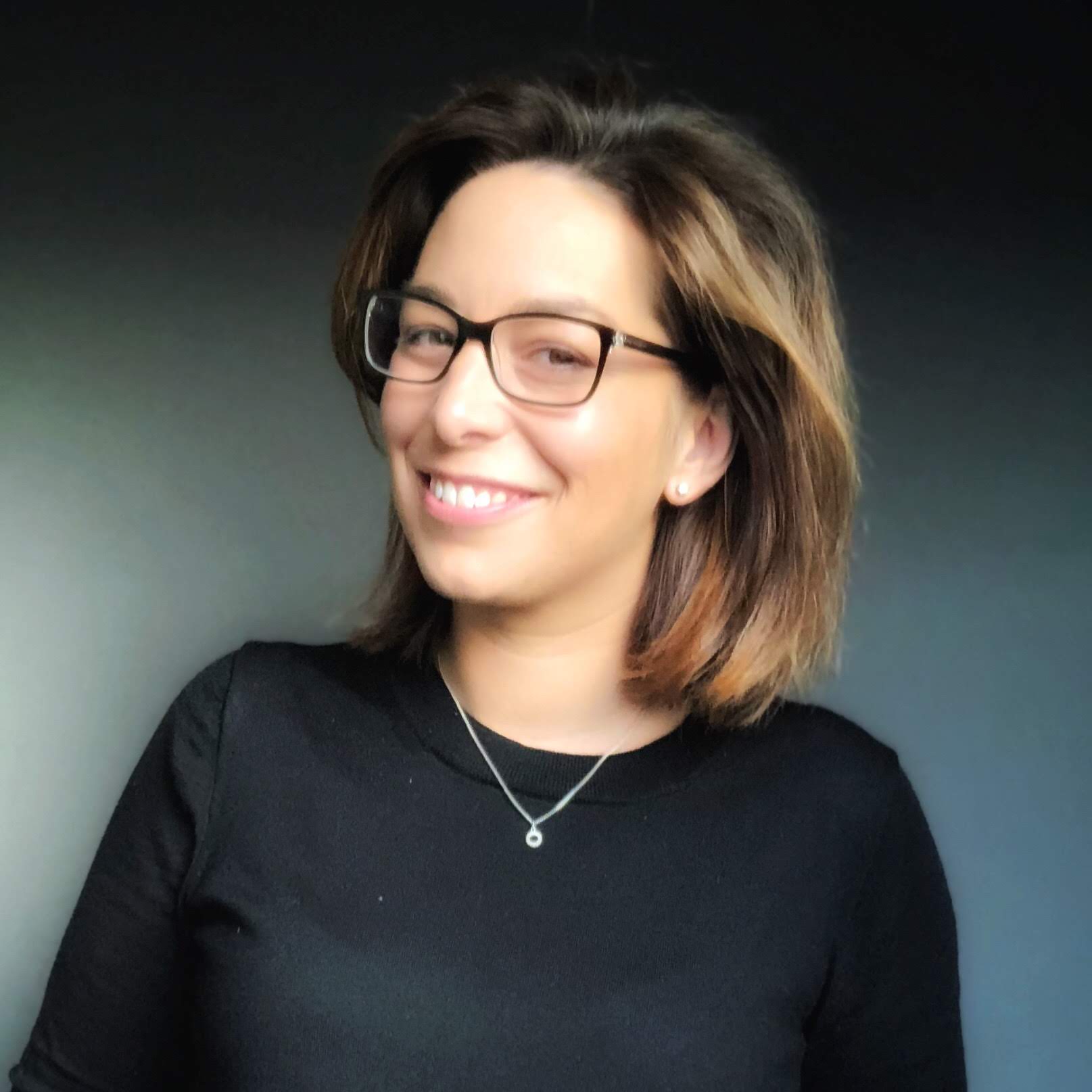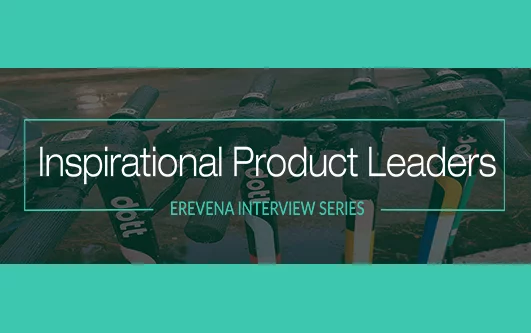Georgie Smallwood is Chief Product Officer at micro-mobility leader TIER. She talks to Erevena’s Jonathan Bryant about her frustration at the lack of women in senior product roles and how the pioneering network she’s building aims to transform funding opportunities for female entrepreneurs and product innovators.
Tell us about your background and what attracted you to a career in product leadership?
I initially wanted to be a journalist as I liked people and their stories. I managed to get into a cadet (apprentice) role with a newspaper in Australia. But I was terrible! I was more interested in storytelling than the facts, which was bad journalism. It’s no surprise that I moved on and got a new job in advertising. As a junior on a magazine, I got to deal with all the freebies that we gave out. That was my first taste of working with products. It was all digital and I discovered the joy and emotion that you can create with digital technology.
I realised that it’s about capturing the hearts and minds and the psychology of someone and taking them on that journey. It was with this understanding that I grabbed an amazing opportunity to join a tech company in 2008 and fell in love with digital product. REA Group has since become one of Australia’s start-up success stories and during the four years I was there it grew from 400 to almost 2,000 employees.
What was it like work for a company in hyper-growth mode?
It was an amazing experience. Every year, we would look at our budgets and targets and ask how we could do it, then we’d just smash it out of the park. We achieved this by working together as a team. When you’re in those hyper growth environments it’s not possible for people to do it on their own. I joined the company as a co-ordinator and by the time I left I was ad operations manager with 25 campaign managers across Australia.
You started with REA in Australia but then moved to Hong Kong – how was that?
It was a great opportunity. I was there for a couple of years, but it wasn’t all plain sailing. I’d gone there on a high after building a team in Australia and thinking I could simply replicate that in Hong Kong. But, of course, we’re talking about two totally different cultures and I had some rethinking to do about how to build high-performing teams. Culture is so important. My Chinese colleagues in Hong Kong valued very different things to those back in Australia, only I didn’t realise this and I was failing massively in the first six months. Whereas in Australia people wanted to be left to get on with things without being micromanaged, this approach simply didn’t work in Hong Kong. I had to understand what my Chinese colleagues needed to be successful and went on a steep learning curve.
How did that experience change you as a leader?
It shaped the way I lead today. I discovered that not everyone needs the same thing to reach the same outcomes. It was an important lesson and one that proved useful when I moved to Scout 24 in Germany. I was on the IPO team, which was a great experience, but once again it was a very different culture to any I’d worked in before. This strengthened my toolkit in terms of not making assumptions. You have to make an individual assessment of the situation and not simply think you can replicate what worked well elsewhere.
How did you take that learning forward?
It was only when I took on the role of Chief Product Officer at European NeoBank N26 that I finally got to pull it all together and use everything I’d learned. This was my first CPO role and my first executive job in a big company. We had over 100 nationalities, so that understanding of cultural nuances was vital. There were 350 people when I joined N26, with just 15 in product and design. When I left 2 and ½ years later, there were 142 in product and design. This was insane hyper-growth and we were constantly bringing in new people from across the world.
You are a passionate advocate of getting more women into senior roles – tell us more
I’ve had amazing experiences and been very fortunate to work with some incredible people throughout my career. However, one of the things I noticed as I was building products in these tech companies and different cultures, and in diverse environments and industries, is that there’s still no more women in senior roles than there were at the beginning. And as a female executive looking to hire senior women right now, I’ve found there aren’t many out there to hire – and that’s concerning. It’s not even the case that there are women close to the top sitting under the glass ceiling waiting to break through; it’s that they simply aren’t there. There are junior and mid-level product professionals, but very few at a higher level.
Why is it difficult to find women in senior product roles?
Many women take time off at a pivotal point in their careers when they’ve just got to the junior or mid-level to have a family. Then it becomes difficult to jump back in because there aren’t enough opportunities, nor the right work-life balance. And by that, I don’t mean just clocking in at nine and clocking off at five; I mean having a bit of respect for the fact that there is more going on in people’s lives than just the job. We need to focus on getting women into leadership roles by coaching them at mid-management level, putting them on courses and giving them access to roles when they come back to work. And we need to embrace things like job sharing. By taking young or inexperienced talent and supporting them through that mid-level of their career, we’ll gain the benefit of their experience later on when they take on more senior roles.
How do we encourage more young women to consider a career in product management?
One of the interesting things about product is that you can’t learn it at university. So, when you join a company, it should be seen more as an apprenticeship. That’s potentially how employers need to look at it too. I like the concept of university being solid grounding in foundational skills, so whether you do finance, or science, or literature, you can become a product manager. In the tech industry – and let’s face it, that’s the future of product management – everything moves so fast, so to be a good product manager you need to learn on the job.
It’s also about having the right growth mindset and knowing that you can learn about product as your career progresses. But while anyone can learn, just because you know things doesn’t make you a great product manager. The great product managers take the information and then, based on their experience and on the things they’ve seen and done, they apply those learnings into new situations.
Why do women make such good product managers?
A great product manager has really high levels of empathy. You need to be able to listen and understand lots of different people’s points of view and then pull it all together into a position so that you come up with a solution. You then need to be able to explain to everyone why that solution is the best thing. Women have been doing this for centuries – running homes, juggling the demands of children, nurturing, caring etc. (and yes, this is rather an archaic view), which is what a project manager also has to do. It’s historically the mother who makes the rules and provides the structure for the household, which again is what’s needed to run a product management team. I’m not saying men can’t run an amazing household, just that the skills women have built over centuries are essential to running modern companies today.
You joined TIER in December 2020 – tell us about that
I was an advisor here before taking on the role of CPO. They’re almost three years old now, so when I first met them they were still a very young start-up, but I was blown away by the maturity of the organisation. The quality of the product managers at a year and a half in was phenomenal. The product team had amazing levels of understanding of the product lifecycle, from research through discovery. That’s something I value highly because research and discovery are so important to successful products. I thought this was amazing and wondered what we could do with it over the next three and four years if we were starting with such a good baseline.
I was also interested because I’d been largely in pure digital companies, so the concept of taking a predominantly hardware product and wrapping it in a brilliant digital solution appealed to me because I hadn’t done it before. It’s very different, even more so than I thought it would be. Everywhere else I’ve worked, the software is the product, but here the software needs to be invisible. It should be so good that you don’t even think about it. I’ve had to rethink my own understanding of the role that software plays.
How important is it to love the product – and how does that reflect at TIER?
I think it helps, especially in a B2C environment where I’ve used the product and loved doing so, but that isn’t the case for everyone. In fact, it’s more important to be invested in the outcome the product is delivering. So, for example, at TIER we’re looking at the different types of users who live in cities and what they need to adopt micro mobility as a sustainable transport form. Every time we move, we create CO2, which is just not sustainable. Whether it’s scooters, whether it’s flying machines, or whether it’s something else, I fundamentally believe that this has to change. I’m interested in what the consumer is thinking and why they are moving anywhere under 5km on anything other than their feet! So, the outcome of our product is what’s important – and that’s to get more people to avoid creating CO2 emissions.
If sustainability is one passion, empowering women in business is another, isn’t it?
Absolutely. Having worked in these environments for 15 years, I’ve always been aware that there weren’t as many senior women as there should be. Then, as I became more senior, I also realised that, as a senior female executive, if I wasn’t going to change things, then who would? So, I started pushing topics that I thought were really important, some of which were received successfully and others not so. After all, it’s not everyone’s major priority but it frustrates me immensely that this is the case.
Then two things happened around about the same time. First, Accel approached me to be in their start-up program, which means that I look for really early-stage companies and invest small amounts in them to get them going. Second, when the PitchBook data for 2020 came out with details of how VC funds had been allocated, 89% of funding went to all-male founding teams. Of the remaining 11%, joint male and female founded companies made up 10%, with just 1% of funding going to all-female founders. It makes my blood boil and I think this is a perfect statement of what the problem is.
Can you explain why you believe networking is both the problem and a solution?
I’ve met some amazing men who are very open and supportive, but at the same time there is a lot of unconscious bias against investing in all-women founded companies. A lot of this unconscious bias flows into their networks and, as I discovered at N26 where we grew a lot of founders, your network is essential. I saw so many talented men getting funding from their network and from the connections that they made in companies – but very few women were making similar connections. I figured that the big problem was women weren’t talking to other women. Rather, they were trying to crack into an existing network, which had often been around for generations, with relationships built from grandfather to father to son and at universities. Women couldn’t compete for funding in this environment.
But there are a lot of women like me who have different things to offer other women. It might be funding through a sale, or advice and, of course, connections. But, at the moment, we’re not talking to each other and we’re definitely not talking to the next generation of women. We need to build our own networks.
What have you done to make a difference and empower women founders?
I joined the Accel Starter Program on the understanding that I would only invest in female-founded organisations. They can be all women, or male and female if they have equal status. But that wasn’t enough for me. So, I have now started a LinkedIn Group called Auxilia. This is Latin for ‘helping hand’, and that’s exactly what we’re giving. It’s a place for women who are founders, interested in founding/co-founding, or want to join early-stage teams. Senior women can offer help and advice to women who don’t have the exposure they need to secure funding. We know that fundraising is a fraught and complex game, so having people to advise you is so important.
Tell us more about Auxilia
I launched the Auxilia LinkedIn Group on a Saturday in March 2021 thinking I’d get around 60 or 70 women interested, and we’ve hit 900 in 5 months! And we now have community platform on the new Geneva app that has almost 200 women actively engaging on it. It’s essentially a networking app where we have different channels, including job opportunities. There are over 200 co-founders or companies that are looking for a female co-founder or early team member posted on there. People simply download the app from the Auxilia LinkedIn Group and join the community. We have some amazing conversations and live chats. I’ve been talking to women who’ve just raised funds and recently to a couple of venture investors. That’s an interesting facet because investing is predominantly a male preserve but there are a lot of women doing amazing things in venture capital, so I want to give access to those women so people can see there is help out there.
What next for you – and for Auxilia?
I’d like to build out the Geneva app and formalise some of the structures. We’re just about to launch Auxilia Ambassadors and I’ve got five or six amazing women who are going to help me with the community. Then I have a bigger plan – we have the LinkedIn Group, which is 900 at the moment, but could be 20,000! We have the networking community, which you need to actively participate in to get any value out and that’s about a quarter of the size of the LinkedIn Group. And then, in the future, I’d like to look at how we can support the founders, whether Auxilia turns into a fund or creates Auxilia founders out of the community.
There are so many women in technology, and others who aren’t in tech, and they might have an idea but don’t know what to do with it. So, they sit back and then watch someone else move ahead with something similar and become a billionaire. They’re thinking ‘I could not have done that’, but I say yes, they could have with the right help.
Share this article:













